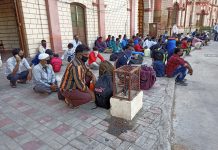We find ourselves at the time when the number of coronavirus infected people is growing by the hour and the pandemic has indeed brought forward some of the biggest challenges of our times in front of the medical and healthcare infrastructure of the country.
The government of India has been making many efforts to control and contain the spread of coronavirus and save lives. Apart from the challenges associated with lack of spending in public healthcare, infrastructural constraints, lack of qualified and trained medical personnel and equipment and a host of other structural and infrastructural concerns, the pandemic has also made us realise the many struggles that Accredited Social Health Activist(ASHA)workers are facing in the country.
And when there is an attempt to locate and understand their problems and concerns, we also gain an understanding of the difficulties and institutional constraints despite which they work within the system.
The contribution made by our ASHA workers in running and sustaining our healthcare infrastructure and taking it to the grassroots is incredible and their work becomes worthy of further praise because they constantly work in a system which is inflexible, stratified and fragile.
ASHA workers began to be recruited in 2005 when the government of India launched the National Rural Health Mission. They were recruited with an aim to take healthcare to the marginalised communities.
More than 9,00,000 ASHA workers are there in India, and it is they who form the bridge between the government and the citizens and fulfil the void in the medical infrastructure in the country which is caused due to the shortage of human power.
The work of ASHA workers becomes even more important in critical emergencies such as the coronavirus pandemic.
The ASHA workers of India are braving the odds and are taking enormous on-field challenges to strengthen and empower rural healthcare access in the country. Due to the requirements and nature of their work, they have been required to play multiple roles at once such as that of health facilitators, health activists and service providers.
It isn’t wrong to say that ASHA workers are risking their everything to take healthcare to the marginalised sections of the population.
As we witness the widespread coronavirus pandemic, many ASHA workers throughout the country have been at the forefront of the battle and are risking their lives in the absence of protective gear and low salaries.
Families of many ASHA workers are afraid that visiting the field may endanger their lives and they may contract the infection but nevertheless our ASHA workers are working for extended hours, in hostile and risky atmospheres to ease out the burden on the medical infrastructure in the country.
From increased workloads to delayed salaries and absence of protective gear to protect themselves from the infection, ASHA workers are facing a lot of difficulties amid the pandemic. They have been engaged in various pandemic related works ranging from activities for raising public awareness regarding the virus, conducting virus related surveys, conducting house-surveys and visiting localities and neighbourhoods, looking for cases of cholera and keeping track on immunisation, family planning, child nutrition among a host of other usual responsibilities.
In the country’s Capital Delhi, ASHA workers have a very important function apart from their contribution to the above mentioned activities, these ASHA workers form a very important part of the medical supply chain.
They especially help expecting mothers take medicine from the dispensary and are engaged in dropping these medicines at their doorsteps when they can’t arrive in person to collect them.
ASHA workers perform a host of duties and are central to the dissemination and democratisation of health system in India.
The coming of the pandemic has multiplied their work and has put an unprecedented load upon them.
What adds to their worries is the fact that because the nature of their work requires them to move from one community to the other, often people resist to their arrival and don’t cooperate with them.
Due to the mobile nature of work, that they have to conduct community surveillance and move from one locality to another, they are forced to face resistance from people as they fear that they will bring infection with them. In a recent attack on ASHA workers, people in Faridabad beat up an ASHA worker as she insisted on conducting a door-to-door survey and people wouldn’t cooperate with her.
ASHA workers in Haryana have also being facing community resistance as they bear the brunt of community distrust apart from already being victims of deep institutional neglect. It is not as if ASHA workers are facing difficulties only in some states of India, the difficulties faced by ASHA workers has indeed become a pan-India issue.
What adds to the problems faced by India’s ASHA workers includes irregularity in receiving payments and salaries, lack of family support, lack of time, overburdening with work, too much geographical area to be looked after and a greater institutional apathy.
It wouldn’t be incorrect to say tat the health system of India is equally responsible for not only recruiting an insufficient number of ASHA workers and not training and equipping them properly but also for its inability to retain them and treat them with due dignity.
It is an urgent need of the hour for the government to ensure that low-level health workers such as ASHA workers are given their due, treated with dignity and their needs are responded to, after all they form the base and the core of our public healthcare.














